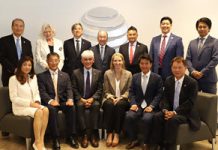 Japan and California share a long history, dating back to 1860 when the first Japanese diplomatic mission arrived in the San Francisco Bay. Today, Japan ranks as California’s and the United States’ fourth largest global trading partner. In the past few decades, the excellent economic and commercial ties between Japan and California have offered numerous opportunities for Japanese and American businesspersons to trade, invest, and collaborate with each other.
Japan and California share a long history, dating back to 1860 when the first Japanese diplomatic mission arrived in the San Francisco Bay. Today, Japan ranks as California’s and the United States’ fourth largest global trading partner. In the past few decades, the excellent economic and commercial ties between Japan and California have offered numerous opportunities for Japanese and American businesspersons to trade, invest, and collaborate with each other.
Under former Prime Minister Shinzo Abe, Japan strengthened its leadership on the world stage and remained a strong ally of the United States. Prime Minister Abe, who tragically died on Friday, championed opening Japanese markets, and helped update global economic rules and standards.
In a statement on Friday, CalChamber President and CEO Jennifer Barrera sent heartfelt condolences to the family of former Prime Minster Abe and to the people of Japan, saying that his “legacy of international leadership and friendship will be honored and long remembered in our state and nation.”
Prime Minister Abe’s diplomatic leadership and guidance salvaged the Trans-Pacific Partnership (TPP), now the Comprehensive and Progressive Agreement for Trans-Pacific Partnership, by rallying 10 other member countries and winning their support for the trade agreement.
Prime Minister Abe also was well aware of the importance of maintaining California connections. In a 2015 visit to the state, he introduced the Kakehashi (bridge) Project to connect Japan and Silicon Valley by sending young professionals and entrepreneurs to Silicon Valley to learn the process of innovations.
California-Japan Relations
As a reflection of California’s continuing interdependence with one of its largest trade and investment partners, the CalChamber meets each year with representatives of the Japan Business Association of Southern California (JBA) and the Japanese Chamber of Commerce of Northern California (JCCNC). The annual gatherings enable the CalChamber and Japanese business leaders to exchange comments on issues common to the economies of Japan, California and the United States.
In March, the CalChamber hosted a reception for the Japanese ambassador to the United States. The reception was the first in-person gathering at the CalChamber offices since the COVID-19 shutdown two years ago. Ambassador Koji Tomita was accompanied by a delegation including Hiroshi Kawamura, Consul General of Japan in San Francisco, and representatives from the business community together with California state government officials.
The Ambassador was escorted to the CalChamber offices by the Lieutenant Governor of California, Ambassador Eleni Kounalakis, and Dee Dee Myers, Director of the Governor’s Office of Business and Economic Development (GO-Biz), following the signing of a Memorandum of Cooperation (MOC) on climate change and energy earlier in the day.
Trade with U.S., California
U.S. exports to Japan were $74.97 billion in 2021, an increase from $63.75 billion in 2020. Chemicals, oil and gas, computers and electronic products, transportation equipment, and agricultural products made up the top imports in 2021. U.S. imports from Japan to the United States were $135.13 billion, with transportation equipment accounting for 35.5% of the total. Non-electrical machinery, chemicals, computer and electronic products, and other electrical equipment made up the other top import categories.
California continues to be a top exporting state to Japan, accounting for more than 15.8% of total U.S. exports. California exports to Japan, the world’s third largest economy, totaled $11.869 billion in 2021. Computers and electronic products accounted for 16% of total exports. Other top exports include transportation equipment, non-electrical machinery, chemicals, and processed foods.
Imports into California from Japan were $22.39 billion in 2021, with transportation equipment accounting for more than a fifth of total imports. California is currently the top importing state in the United States for products from Japan.
In California, Japan is the largest source of foreign direct investment (FDI) through foreign-owned enterprises (FOEs), according to the World Trade Center Los Angeles FDI Report. In 2020, Japanese FOEs in California provided 115,420 jobs through 3,672 firms amounting to $10.6 billion in wages, down from 121,223 jobs through 3,880 firms amounting to $10.988 billion in wages in 2019. The top jobs by sector are: manufacturing, wholesale trade, retail trade, financial activities, and professional/business services.
Trade Missions to Japan
In both 2004 and 2010, the California Chamber of Commerce participated in Governor Arnold Schwarzenegger’s trade and tourism missions to Japan to promote California’s business climate, encourage travel and tourism, and market California-grown products. The Governor and delegation accompanying him met with business and government leaders and participated in events to promote California.
The CalChamber participated in California gubernatorial trade missions back to the 1980’s indicating the long-term economic relationship with Japan.
CalChamber Position
The California Chamber of Commerce, in keeping with long-standing policy, enthusiastically supports free trade worldwide, expansion of international trade and investment, fair and equitable market access for California products abroad and elimination of disincentives that impede the international competitiveness of California business.
Staff Contact: Susanne T. Stirling

